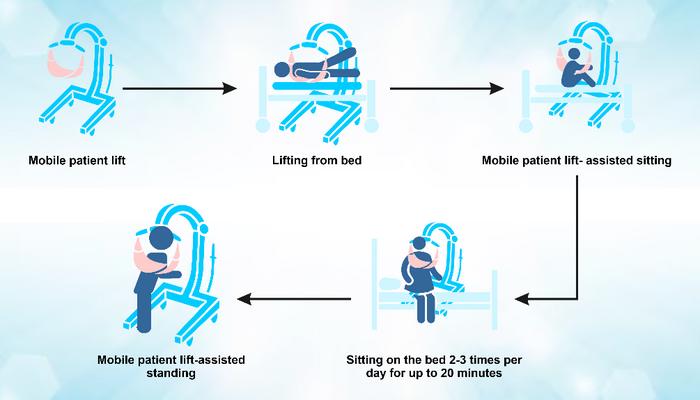Tokyo, Japan – A recent randomized controlled trial in Tokyo, Japan, has unveiled the positive impact of early mobilization, assisted by mobile patient lifts, on the recovery of ventilated intensive care unit (ICU) patients. The debate surrounding the efficacy of early mobilization in ICU has persisted for an extended period.

Credit: Dr. Ginga Suzuki
Tokyo, Japan – A recent randomized controlled trial in Tokyo, Japan, has unveiled the positive impact of early mobilization, assisted by mobile patient lifts, on the recovery of ventilated intensive care unit (ICU) patients. The debate surrounding the efficacy of early mobilization in ICU has persisted for an extended period.
The treatment of critically ill patients in ICUs, often involving prolonged limb immobilization or restricted mobility, is acknowledged as a risk factor for diminished physical strength and diminished quality of life post-recovery, commonly termed as post-intensive care syndrome (PICS) or ICU-acquired weakness (ICU-AW). While early mobilization, the initiation of physical activity in the early stages of ICU treatment, has been suggested as a preventive measure for ICU-AW, its impact on outcomes has been highly controversial. This new study aimed to investigate whether a more proactive approach to early mobilization, assisted by mobile patient lifts, could facilitate mobilization compared to usual rehabilitation.
The study enrolled 80 patients who received ventilation for a minimum of 48 hours. The intervention group underwent assistance in sitting, standing, transfers, and walking using a mobile patient lift. The researchers observed that the use of mobile lifts led to earlier standing (on day 1, compared to day 3 in the control group after the initiation of rehabilitation). Furthermore, the intervention group exhibited higher Functional Status Score for the Intensive Care Unit scores (FSS-ICU) at ICU discharge, physical function during ICU stay. This study underscores the benefits of early mobilization for mechanically ventilated ICU patients when combined with the use of mobile patient lifts. Given the historical controversy surrounding the effectiveness of early mobilization, these findings may contribute to our understanding of the recovery process in ICU patients.
“We anticipate that proactive early mobilization, with the assistance of mobile patient lifts, will play a pivotal role in preventing post-intensive care syndrome. To draw conclusive evidence for the advantages of early mobilization, further studies should accumulate supportive data,” remarked Dr. Ginga Suzuki, the lead author of the study.
Journal
Critical Care Medicine
DOI
10.1097/CCM.0000000000006219
Method of Research
Randomized controlled/clinical trial
Subject of Research
People
Article Title
Early mobilization using a mobile patient lift in the intensive care unit: A randomized controlled trial
Article Publication Date
6-Feb-2024
COI Statement
The authors declare they have no conflict of interest regarding the publication of this article.




